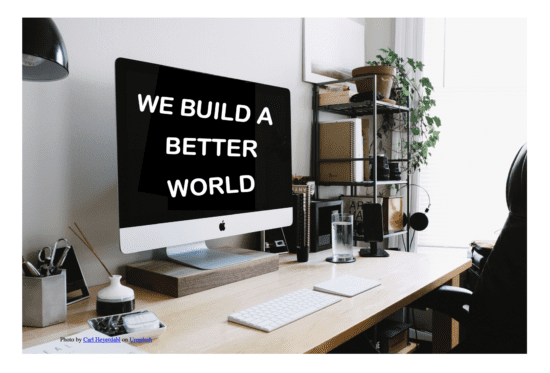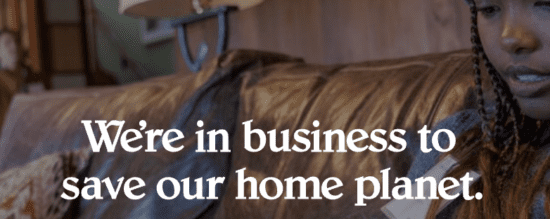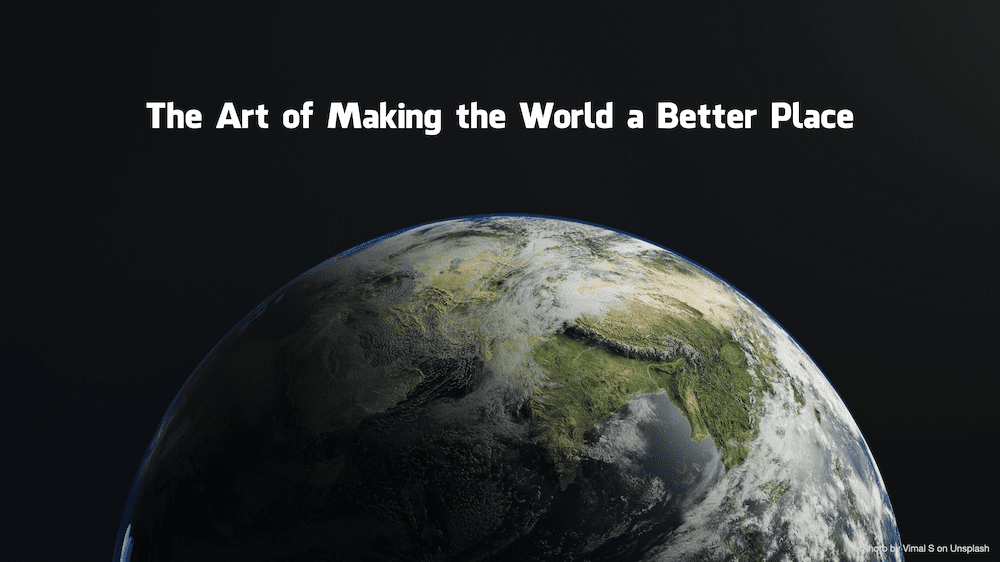The Power of Wonder and Curiosity
 Sparked by a post on LinkedIn by my friend, Lidewij, I wanted to expand on a few thoughts. The desire to make the world a better place often stems from a childlike sense of wonder and curiosity. This attitude, full of hope and enthusiasm, can be incredibly invigorating. In fact, on the face of it, it is a charming if not inspirational objective. However, it can also feel daunting if not downright depressing. To effectively channel your energy and avoid potential burnout or disillusionment, it’s crucial to approach this noble ambition with a thoughtful and structured mindset. In a world where there is much wonderment and so much progress, there is also a puzzlingly high level of distress, as witnessed by the alarmingly high levels of mental health disorders. I would go so far as to say that it is essential to bring a word of caution about seeking to make the world a better place, especially for all of those with, or at risk of, mental health conditions.
Sparked by a post on LinkedIn by my friend, Lidewij, I wanted to expand on a few thoughts. The desire to make the world a better place often stems from a childlike sense of wonder and curiosity. This attitude, full of hope and enthusiasm, can be incredibly invigorating. In fact, on the face of it, it is a charming if not inspirational objective. However, it can also feel daunting if not downright depressing. To effectively channel your energy and avoid potential burnout or disillusionment, it’s crucial to approach this noble ambition with a thoughtful and structured mindset. In a world where there is much wonderment and so much progress, there is also a puzzlingly high level of distress, as witnessed by the alarmingly high levels of mental health disorders. I would go so far as to say that it is essential to bring a word of caution about seeking to make the world a better place, especially for all of those with, or at risk of, mental health conditions.
Three Essential Questions to Consider
 Before embarking on a journey to improve the world, it’s important to reflect on three fundamental questions:
Before embarking on a journey to improve the world, it’s important to reflect on three fundamental questions:
- What exactly do we want to make better?
- Why is this matter of deep personal importance?
- When we say the “world,” which world are we talking about?
Let’s explore each of these questions in more detail.
1. Defining the Scope of Improvement
When we talk about making the world better, it’s important to identify specific areas for improvement. What part of the world’s problems do we want to tackle? This could range from environmental conservation to economic equality, from ending starvation to curing different diseases.
While many intellectuals, such as Peter Singer, renowned philosopher and ethicist, might militate for a broad and ambitious approach to improving the world, I caution against such. As William Easterly, economist and author, argues, many well-intentioned efforts to improve the world fail due to a lack of specific, measurable objectives [source]. This sense of failure, when the objectives are too broad and unachievable, can have ill effects on one’s sense of achievement, if not mental health.
2. Personal Importance and Motivation
Understanding why a particular cause is personally important can provide the necessary drive and resilience to pursue long-term change. There are three things that underlie this perspective. First, since there are so many issues out there, it’s useful to have a guiding light as to which problem you intend to tackle. Secondly, if you have a personal attachment to the problem, it will encourage the greatest amount of engagement. This type of attachment will help toward success. Angela Duckworth, psychologist and author of “Grit”, emphasizes the importance of personal passion in achieving long-term goals. She argues — and I agree — that connecting our efforts to deeply held values can sustain motivation over time [source]. Thirdly, by having a personal engagement — and in light of the amount of effort that will be needed (without necessarily getting any material payback) — the sense of fulfilment in doing something that is personally important will help avoid total burnout. Because when you know WHY you’re doing something, it gives back energy. Meanwhile, another Yalie and author of “Against Empathy”, Paul Bloom, warns against relying solely on emotional connection to causes. He suggests that rational analysis is equally important in determining where to focus our efforts. I certainly believe that having a rational, numbers-based objective is necessary for the good functioning of any “do good” project. Yet, it can’t (or shouldn’t) remain an entirely intellectual exercise, divorced of personal commitment.
3. Defining the “World” We Aim to Improve

What is “the world” you want to impact?
The concept of “world” can vary greatly, from one’s immediate community to the global population or even future generations. Trying to fix “the whole wide world” is a tall, a.k.a. unrealistic, order that is destined to fail (for a number of reasons). Thus, it’s key to define what part of the world you’re talking about. Not only do I see people trying to bite off more than they can chew, but the reality is also that these very same people aren’t able to fix their own local community or nearby world. I am reminded of the biblical saying that, rather than wishing to fix the speck in someone else’s eye, they ought to worry first about the plank in their own eye. Political scientist, Robert Putnam, argues for focusing on local communities first, suggesting that strengthening local social bonds can have ripple effects on larger scales [further reading]. In a world where IRL local communities seem to be weakening (for example, at the local church) in favour of more amorphous and abstract global communities, how can one possibly fix the worldwide bigger issue if we don’t even know how to fix the smaller, local problem?
Balancing Ambition and Realism
While the ambition to contribute to making the world better is admirable, it’s essential to modulate this desire to avoid burnout or disillusionment. Burnout is a real risk for those who throw themselves at fixing global social causes. Christina Maslach, a pioneering researcher on occupational burnout, identifies three key dimensions of burnout: exhaustion, cynicism, and inefficacy [source]. To avoid these pitfalls, it’s crucial to set realistic goals and define the world you want to fix!
Purpose as a corporate ambition
There are similar caveats for companies that declare a higher purpose or raison d’être. Many purpose statements seem utterly vacuous or ludicrously ambitious. I discovered that, in 2020, 29 of the Fortune 500 companies had the word “world” inscribed in their purpose, many of which implied they were fixing the whole world. Here are a few statements {source} that left me scratching my head and I suggest could be ripe for a rewording. Naturally, from the inside, these purpose statements may make much more sense. But, from the outside, they seem like an overstatement. I’ve put my comments in parentheses when I felt there was something to remark:

Fluor – We Build a Better World
- Advanced Micro Devices: In 2020, their purpose statement was “Technology enabling a better world.” {This includes AMD devices in drones being deployed, for example, in war}. They’ve since changed it to: “We embed corporate responsibility across our global operations and communities, so that together we advance_” {source} which seems like a more realistic statement of intention.
- Aecom: “Built to deliver a better world.” {through infrastructure}
- Aramark: “Creating a better world for generations to come.” {through hospitality}.
- Booz Allen Hamilton Holding: “We empower people—our colleagues, our clients, our communities—to change the world.” {Booz, like McKinsey, has been identified for consulting companies or government in some nefarious activities}
- Fluor: “We Build a Better World.”
- Hess: “To be the world’s most trusted energy partner.” {in good old oil and gas}
- JLL: “We shape the future of real estate for a better world.” {the world’s real estate influencer}
- M&T Bank: “To make a difference in people’s lives.” {in 8 states in the US}
- Molson Coors Beverages: “Uniting people to celebrate all life’s moments.” {including funerals?}
- Office Depot: “It’s all about doing the right thing – for our shared planet, our valuable communities, and the future of how we service and support our customers.” {That’s a strong ethical line, that is quite often used… For example, “to do the right thing” is touted as a core value at Home Depot, ironically having nothing to do with Office Depot}
- Owens Corning: “Our people and products make the world a better place.”
- Tyson Foods: “We feed the world like family.™ Raising the world’s expectations for how much good food can do” {source}. {2.3 billion chickens killed per year, serving McDonalds, Burger King, and KFC to name but a few of the “good” food providers}
Patagonia is something of an outlyer and has long had a purpose-led approach. It has the advantage of being privately held (or as founder, Yvon Chouinard, imposed, has as its only shareholder: Earth). And their mission is about saving Earth:

“We’re in business to save our home planet”
Erik Orsenna (Arnoult), the French politician and novellist, once said that there is nothing sillier than trying to save the planet since, at the end of the day, the planet is going to survive well beyond us. For Patagonia, it does seem that that purpose and profits are compatible. Yet, coming back to Orsenna’s point, with so many companies aiming to improve the World, it’s clear that the people in this world are in need of healing. In any event, writing a meaningful purpose for a company is a complex task since it requires being sufficiently broad to appeal to the stakeholders, and be credible for your business, ambitious enough to inspire and yet realistic enough to believe it can be achieved. Based on these purpose statements above, I have three questions for each company:
- How do they measure success in their purpose?
- To what extent is this purpose believed and lived by its internal stakeholders?
- Just how does this purpose orient their decision-making?
Strategies for Effective World Improvement
To effectively contribute to making the world better while avoiding burnout, consider the following strategies:
- Set specific, measurable goals: Instead of aiming to “save the world,” focus on concrete, achievable objectives. I would suggest starting with defining what you mean by the world.
- Start locally. Begin by making a difference in your immediate community before expanding your efforts.
- Collaborate with others. Join or form groups with like-minded individuals to amplify your impact and share the workload.
- Educate yourself. Continuously learn about the issues you’re addressing to ensure your efforts are well-informed and effective. Given the never-ending slew of tech advancements, keep an eye out for how technology can help alleviate the workload.
- Practice self-reflection. Regularly assess your motivations, progress, and well-being to maintain a healthy perspective.
Conclusion: A Balanced Approach to World Improvement
The desire to make the world a better place is a noble and invigorating ambition. However, to effectively channel this energy and avoid burnout or disillusionment, it’s crucial to approach this goal with a thoughtful and structured mindset. By carefully considering what we want to improve, why it’s personally important, and which “world” we’re focusing on, we can set ourselves up for meaningful and sustainable impact. With a balanced approach that combines wonder, critical thinking, and self-care, we can all contribute to making the world a better place, one step at a time.
“The mystery of human existence lies not in just staying alive, but in finding something to live for.”
―from The Brothers Karamazov by Fyodor Dostoyevsky











